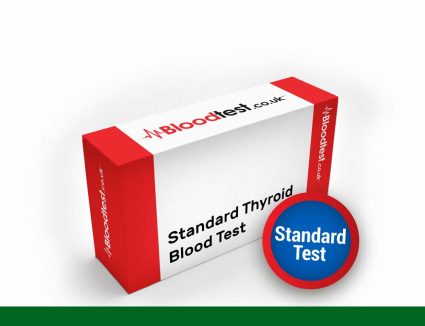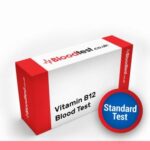Essential Insights into Thyroid Blood Testing for Optimal Health
 A thyroid blood test serves as a crucial diagnostic tool that assesses the hormonal output of the thyroid gland. This gland plays an integral role in regulating metabolism, energy production, and a multitude of essential bodily functions. Understanding the results from these tests can provide significant insights into your overall health status. In Burnley, where access to quality healthcare is paramount, being knowledgeable about the thyroid blood test allows individuals to take proactive measures in managing their health effectively.
A thyroid blood test serves as a crucial diagnostic tool that assesses the hormonal output of the thyroid gland. This gland plays an integral role in regulating metabolism, energy production, and a multitude of essential bodily functions. Understanding the results from these tests can provide significant insights into your overall health status. In Burnley, where access to quality healthcare is paramount, being knowledgeable about the thyroid blood test allows individuals to take proactive measures in managing their health effectively.
The thyroid gland produces key hormones, primarily thyroxine (T4) and triiodothyronine (T3), which govern the body's energy utilisation. Typically, a blood test evaluates the levels of these hormones in conjunction with the thyroid-stimulating hormone (TSH), which prompts the thyroid to increase hormone production. An imbalance in these hormone levels may indicate conditions such as hypothyroidism (characterised by an underactive thyroid) or hyperthyroidism (marked by an overactive thyroid), leading to symptoms that can significantly diminish one’s quality of life.
There are numerous compelling reasons to consider undergoing a thyroid blood test. Symptoms such as persistent fatigue, unexpected weight changes, mood swings, or irregular sleep patterns may all be indicative of thyroid dysfunction. Additionally, some individuals may pursue testing as part of routine health evaluations, especially if there is a family history of thyroid-related issues. Early recognition of these symptoms is vital, as timely diagnosis can facilitate more effective management and treatment alternatives.
Preparing for your thyroid blood test is usually a straightforward process, but it is essential to adhere closely to your GP's recommendations. In certain situations, fasting may be necessary to guarantee accurate results. Moreover, it is crucial to communicate any current medications or supplements, as these can affect hormone levels. Your GP will offer personalised guidance based on your individual circumstances, ensuring you are well-prepared for your thyroid blood test in Burnley.
Understanding What a Thyroid Blood Test Entails

A thyroid blood test is a clinical evaluation that involves obtaining a small blood sample to measure the levels of thyroid hormones present in the bloodstream. The primary hormones assessed are T3 and T4, along with TSH, which is essential for understanding the operational status of the thyroid gland. This test often acts as the first step in diagnosing thyroid disorders and plays a pivotal role in managing overall health.
The blood sample is typically collected from a vein in your arm. Although this procedure is straightforward, its implications are profound, as the results can reveal potential thyroid complications that may require further investigation or treatment. In Burnley, numerous healthcare facilities are equipped to carry out this test efficiently, ensuring that residents receive timely and precise diagnoses.
Understanding the results of your thyroid blood test is crucial for your health journey. Elevated TSH levels may indicate hypothyroidism, while low TSH levels could suggest hyperthyroidism. These interpretations enable healthcare professionals to formulate tailored treatment plans for thyroid disorders, ultimately guiding patients towards improved health outcomes.
Identifying Key Reasons to Request a Thyroid Blood Test
Symptoms of thyroid dysfunction can vary significantly and often overlap with other health issues, making a thyroid blood test essential for pinpointing underlying health concerns. If you are experiencing ongoing fatigue, unexplained weight changes, or emotional fluctuations, it may be prudent to discuss the possibility of a thyroid blood test in Burnley with your GP.
Routine health check-ups also motivate many individuals to undergo thyroid blood tests. Healthcare providers often recommend regular screenings, particularly for those over 60 or for individuals with a family history of thyroid disorders. This proactive approach promotes early detection and management of potential health complications before they escalate into more severe conditions.
Furthermore, specific life stages or circumstances, such as pregnancy, may warrant testing due to the crucial role thyroid health plays in both maternal and fetal well-being. Fluctuations in thyroid hormone levels during and after pregnancy necessitate consistent monitoring to ensure a healthy pregnancy.
Ultimately, being aware of your body’s signals and seeking a thyroid blood test when needed can significantly enhance health outcomes and improve quality of life. Whether prompted by symptoms or routine evaluations, understanding when to pursue testing is a vital first step towards optimal thyroid health.
Maximising the Effectiveness of Your Thyroid Blood Test Preparation
Preparing for a thyroid blood test generally involves adhering to a few straightforward steps that can enhance the accuracy of the results. While fasting is not universally required for thyroid testing, your GP might advise it based on your unique health context or if other tests are being conducted simultaneously. Clarifying any specific instructions with your healthcare provider before the test is vital to ensure they align with your health needs.
Additionally, it is crucial to inform your GP of any medications, supplements, or herbal products you are currently taking, as these can influence hormone levels. Certain medications, particularly those that affect thyroid function, may need to be paused prior to testing. Clear communication with your healthcare provider can help prevent potential complications or inaccuracies in your results.
On the day of your test, ensuring adequate hydration can facilitate a smoother and more comfortable blood draw. Remaining calm during the procedure is also beneficial; employing calming techniques such as deep breathing can help alleviate any anxiety associated with blood testing.
By adequately preparing, you can ensure that your thyroid blood test in Burnley is as informative and beneficial as possible, paving the way for effective management of your thyroid health.
Convenient Locations for Thyroid Testing in Burnley

Residents of Burnley have the advantage of multiple options for obtaining a thyroid blood test. From local GP surgeries to private clinics and hospital services, accessing this essential test has never been easier. Knowing where to go for your testing can save you time and ensure you receive the highest-quality care.
Leveraging Local GP Surgeries for Thyroid Testing
Many GP surgeries in Burnley incorporate thyroid blood tests as part of their routine diagnostic services. If you suspect thyroid issues or have been advised to undergo testing, your local GP can facilitate this process. Generally, you will need to arrange an appointment to discuss your symptoms and receive a referral for the blood test.
Most GP surgeries have the capability to collect blood samples on-site, allowing for prompt results. Furthermore, your GP will be familiar with your medical history, enabling more personalised care and follow-up based on the test outcomes. Should your results reveal a thyroid function concern, your GP can recommend appropriate treatment options or refer you to an endocrinologist for specialised care.
It's advisable to confirm whether your GP surgery has specific days set aside for blood tests, as this can enhance the efficiency of your visit. Many GPs in Burnley aim to deliver comprehensive services, making them a convenient first point of contact for addressing your thyroid health.
Investigating Private Clinics for Thyroid Blood Testing
Numerous private clinics in Burnley provide expedited or more confidential thyroid blood testing options for those seeking quicker results. Private clinics often offer the benefit of flexible appointment scheduling that accommodates your busy lifestyle. They typically have shorter wait times for testing and results, which can be advantageous for patients eager to gain insights into their thyroid health.
These clinics frequently employ advanced technology and methodologies to ensure precise results and efficient service delivery. Privacy and confidentiality are prioritised, making private clinics an excellent option for individuals who prefer a more discreet approach to their healthcare.
However, it is essential to conduct thorough research into the credentials of any private clinic you consider. Look for established facilities with positive reviews and qualified healthcare professionals to ensure you receive high-quality care throughout your testing experience.
Hospital Services for Comprehensive Thyroid Testing

Burnley General Hospital serves as another critical venue for residents seeking a thyroid blood test. As part of its extensive diagnostic services, the hospital offers a range of tests, including those specifically pertaining to thyroid health. Testing at a hospital can be particularly advantageous if your condition requires further investigation or specialist input.
When you visit the hospital for your thyroid blood test, you can expect a well-coordinated process, often overseen by specialised staff trained in blood collection and laboratory sample handling. Your results will be processed in the hospital laboratory, with a strong emphasis on accuracy, ensuring reliable information regarding your thyroid function.
If your GP has referred you to the hospital for testing, they will likely remain involved in your ongoing care, discussing results and potential treatment options based on the findings. This continuity of care is especially important for managing chronic conditions such as thyroid disorders.
Ultimately, whether you choose a local GP surgery, a private clinic, or hospital services, Burnley offers ample options for obtaining a thyroid blood test. Each facility is committed to ensuring you receive the necessary support and information to effectively maintain your thyroid health.
Navigating the Thyroid Testing Process with Confidence
Familiarising yourself with the thyroid blood test process can alleviate anxiety and help you prepare for the experience. Knowing what to expect can ensure the procedure goes smoothly and instil confidence in your health assessment.
The Collection Process for Blood Samples
The initial stage of the testing process involves collecting a blood sample, typically drawn from a vein in your arm. This procedure is generally quick and straightforward, performed by a trained healthcare professional. You may be asked to sit in a comfortable chair while the professional cleans the area with antiseptic and applies a tourniquet to enhance the vein's visibility.
Once the area is prepared, a needle is inserted into the vein to draw a small amount of blood. Most individuals experience only mild discomfort, akin to a quick pinch. The collected sample is then placed in a sterile container for transport to the laboratory, where it will undergo analysis to measure your thyroid hormone levels.
Preparation protocols can vary. Although fasting is not typically required for a thyroid blood test, it may be advisable in certain cases. Always confirm the specific requirements for your test with your healthcare provider to ensure the accuracy of the results.
Thorough Laboratory Analysis of Thyroid Hormones
Once the blood sample has been collected, it is dispatched to a laboratory for comprehensive analysis. Laboratory technicians will assess the levels of thyroid hormones in your blood, including T3, T4, and TSH. This analytical process usually takes a few days, as samples undergo meticulous evaluation to guarantee accuracy and reliability.
Laboratories use advanced technology to conduct these tests, often employing highly sensitive equipment capable of detecting even minor fluctuations in hormone levels. This precision is vital, as small variations can signify significant changes in thyroid health.
The results generated from the laboratory analysis will assist your healthcare provider in determining whether your thyroid function is within normal parameters or if further investigation is necessary. The efficiency and accuracy of the laboratory process are crucial components of your overall health assessment.
Receiving and Interpreting Your Thyroid Test Results
Once your thyroid blood test has been processed, your healthcare provider will contact you to discuss the results. Typically, results are available within a few days, although this timeframe may vary depending on the facility and the specific tests conducted.
Upon receiving your results, your doctor will explain what the thyroid hormone levels indicate. They will clarify whether your results are within the normal range and outline what steps, if any, should be taken based on those findings. This discussion is crucial for understanding your thyroid health and determining any necessary actions moving forward.
For many individuals, receiving the results can provoke a mix of relief and anxiety. Regardless of the outcome, maintaining open communication with your healthcare provider is essential for grasping your results and understanding how they impact your health.
Decoding the Significance of Your Thyroid Test Outcomes
Interpreting your thyroid blood test results is critical for understanding your thyroid health. Normal thyroid hormone levels fluctuate but generally signify that your thyroid gland is functioning properly. Your doctor will clarify the specific ranges for TSH, T3, and T4, aiding you in comprehending what these numbers indicate for your overall well-being.
If your results indicate elevated TSH levels, this may suggest hypothyroidism, a condition characterised by insufficient hormone production from the thyroid. Conversely, low TSH levels may indicate hyperthyroidism, where the thyroid is overly active. In some cases, further testing may be necessary to confirm a diagnosis or to rule out other potential conditions.
Your healthcare provider will elucidate the implications of your test results and outline any necessary next steps. Depending on your specific situation, additional tests, treatment options, or lifestyle modifications may be recommended to effectively manage your thyroid health.
Understanding and interpreting your thyroid blood test results is a collaborative effort between you and your healthcare provider. Open dialogue and professional guidance empower you to take control of your thyroid health and make informed decisions regarding your care.
Essential Follow-Up Actions Following Your Test Results
After receiving your thyroid blood test results, engaging in follow-up actions is crucial for effectively managing your thyroid health. Depending on the outcomes, your healthcare provider may recommend various approaches tailored to your needs.
If your results indicate a thyroid disorder, further testing may be necessary to confirm the diagnosis or ascertain its cause. This could involve additional blood tests or imaging studies to thoroughly evaluate your thyroid gland's structure and functionality.
In the case of hypothyroidism, your doctor may initiate treatment through hormone replacement therapy, typically prescribing synthetic thyroid hormones to restore balance. For those diagnosed with hyperthyroidism, treatment options may include medication, lifestyle changes, or, in some instances, surgical intervention to remove part of the thyroid gland.
Regular monitoring of your thyroid health is essential, and follow-up appointments will likely be scheduled to assess the effectiveness of any prescribed treatment. This consistent oversight helps ensure that any fluctuations in your thyroid hormone levels are promptly addressed, minimising the risk of complications.
Additionally, your healthcare provider may discuss lifestyle adjustments that can support your thyroid health, such as dietary changes or exercise recommendations. These modifications can significantly enhance your overall well-being and assist in managing thyroid conditions more effectively.
Taking proactive measures based on your thyroid blood test results can lead to improved health outcomes and a better quality of life. Regular communication with your healthcare provider is key to successfully navigating your thyroid health journey.
Deciphering Your Thyroid Test Results for Better Health
Decoding your thyroid blood test results is essential for effectively managing your thyroid health. Understanding the normal ranges for thyroid hormones and what deviations from these ranges may signify empowers you to make informed decisions about your health.
Grasping Normal Ranges for Thyroid Hormones
Normal thyroid hormone levels are typically defined within specific reference ranges, although these can vary slightly depending on the laboratory conducting the analysis. Generally, the normal range for TSH is approximately 0.4 to 4.0 mIU/L, while T3 and T4 levels also have established ranges. These values serve as critical indicators of your thyroid's performance.
If your test results fall within these normal ranges, it usually indicates that your thyroid is functioning as it should. This is reassuring and suggests that you are likely not facing significant thyroid-related issues. However, it’s important to remember that normal values can differ based on age, sex, and overall health, so always consult your healthcare provider for a comprehensive interpretation.
Understanding these ranges is essential as they form the baseline against which your hormone levels are assessed. If your results fall outside of the normal ranges, this could suggest potential thyroid dysfunction, necessitating further investigation and possibly leading to a diagnosis.
Identifying Elevated or Decreased Levels of Thyroid Hormones
If your thyroid blood test reveals elevated or decreased levels of thyroid hormones, this often points to an underlying condition. Increased TSH levels might suggest hypothyroidism, characterised by an underactive thyroid that fails to produce adequate hormones. Common symptoms may include fatigue, weight gain, and cold intolerance, significantly impacting daily life.
Conversely, low TSH levels often indicate hyperthyroidism, where the thyroid is overactive and producing excessive hormones. Symptoms of hyperthyroidism can encompass weight loss, rapid heartbeat, anxiety, and increased perspiration. Understanding these conditions is vital, as they require different management strategies and interventions.
In either scenario, your healthcare provider will evaluate your symptoms alongside your test results to determine the most effective course of action. This may involve additional testing or a referral to a specialist, particularly in complex cases where thyroid disorders coexist with other health concerns.
Recognising the implications of high or low thyroid levels can lead to timely intervention, which is critical for preventing complications and ensuring a better quality of life.
Steps to Take After Receiving Your Test Results
After you receive your thyroid blood test results, it is crucial to discuss the next steps with your healthcare provider. Based on the results, various pathways may be available for efficiently managing your thyroid health.
If your results suggest a thyroid disorder, the subsequent steps might involve further diagnostic testing to confirm the diagnosis. This could include imaging tests, such as ultrasounds, to assess the structure of the thyroid gland or additional blood tests to gather more information regarding your hormone levels.
Your doctor will outline the available options in scenarios where treatment is necessary. Treatment for hypothyroidism typically involves hormone replacement therapy, while hyperthyroidism may require medication, lifestyle modifications, or even surgical intervention. Your healthcare provider will customise the treatment plan to suit your circumstances, ensuring you receive the most appropriate care.
Regular follow-ups are essential in managing thyroid health. Your healthcare provider may recommend periodic blood tests to monitor your hormone levels and adjust your treatment plan as necessary. This ongoing vigilance helps to minimise the risk of complications and ensures that your thyroid function remains stable.
Ultimately, the next steps following your thyroid blood test results can significantly influence your overall health and well-being. Engaging with your healthcare provider and adhering to recommended treatment plans are vital for optimal thyroid health.
Exploring Common Thyroid Disorders and Their Consequences
Thyroid conditions can profoundly impact individuals’ health, leading to a wide array of symptoms and complications. Understanding these common disorders is crucial for recognising the signs and seeking appropriate medical intervention.
Understanding Hypothyroidism and Its Effects
Hypothyroidism, or an underactive thyroid, occurs when the thyroid gland does not produce sufficient hormones. Symptoms can vary significantly, but commonly include fatigue, weight gain, depression, and increased sensitivity to cold. In the UK, hypothyroidism is a prevalent condition, often diagnosed through thyroid blood tests that reveal elevated TSH levels alongside low T3 and T4 levels.
The causes of hypothyroidism can include autoimmune disorders, such as Hashimoto's thyroiditis, surgical removal of the thyroid gland, or radiation treatment. Treatment typically involves hormone replacement therapy to restore hormone levels and alleviate symptoms. Regular monitoring is essential to ensure hormone levels remain stable and to make necessary medication adjustments.
Living with hypothyroidism requires ongoing management, and many individuals find support groups and resources available in the UK beneficial for navigating their condition.
Dealing with Hyperthyroidism Challenges
Hyperthyroidism, characterised by the excessive production of thyroid hormones, can lead to various symptoms, including weight loss, increased appetite, rapid heartbeat, and anxiety. Common causes include Graves’ disease, toxic nodular goitre, and thyroiditis. Diagnosis often involves a thyroid blood test that reveals low TSH levels alongside elevated T3 and T4 levels.
Managing hyperthyroidism typically entails a combination of medication, lifestyle changes, and, in some cases, surgical intervention. Antithyroid medications can help reduce hormone production, while beta-blockers may be prescribed to manage symptoms like rapid heartbeat and anxiety.
Education about the condition is vital, as patients must understand their treatment options and the implications of living with hyperthyroidism. Continuous monitoring through routine thyroid blood tests is also crucial for effectively managing the condition.
Thyroid Nodules and Cancer Considerations
Thyroid nodules are lumps that can develop in the thyroid gland; while the majority are benign, some may be cancerous. Routine thyroid blood tests can help monitor nodule development and functionality. When nodules are detected, further ultrasound or fine-needle aspiration evaluation may be necessary to assess their nature.
A multidisciplinary approach may be adopted if cancer is suspected, involving endocrinologists, surgeons, and oncologists to devise the most effective treatment plan. This may include surgery, radioactive iodine treatment, or other targeted therapies.
Being aware of the signs of thyroid nodules and cancer is crucial, as early detection can significantly improve outcomes. Regular check-ups and discussions with healthcare providers empower individuals to take proactive steps in managing their thyroid health.
Understanding Thyroiditis and Its Implications
Thyroiditis refers to inflammation of the thyroid gland, which can lead to either hypothyroidism or hyperthyroidism, depending on the type and progression of the condition. Common forms include Hashimoto's thyroiditis and subacute thyroiditis. Symptoms may encompass neck pain, changes in hormone levels, and thyroid enlargement.
Treatment for thyroiditis often hinges on the underlying cause and symptoms. In some cases, anti-inflammatory medications may be prescribed, while others may require hormone replacement therapy. Education and support for individuals with thyroiditis are crucial, as managing this condition often necessitates ongoing monitoring and lifestyle adjustments.
Understanding thyroiditis and its implications can facilitate early identification and treatment, ultimately enhancing the quality of life for those affected.
Promoting Thyroid Health Through Lifestyle Choices
Maintaining optimal thyroid health depends not solely on medical interventions; lifestyle choices significantly influence thyroid function. A holistic approach that includes diet, exercise, and environmental awareness can foster optimal thyroid health.
The Significance of Diet and Nutrition
Diet plays a pivotal role in thyroid function, with specific nutrients essential for hormone production and regulation. Iodine, for instance, is fundamental for synthesising thyroid hormones, necessitating adequate sources such as fish, dairy, and iodised salt in your diet. However, individuals with autoimmune thyroid conditions should exercise caution regarding iodine intake, as excessive levels can exacerbate symptoms.
Other vital nutrients include selenium and zinc, which support thyroid hormone metabolism and overall gland health. Incorporating a wide variety of whole foods rich in these nutrients can bolster thyroid function. Furthermore, antioxidants found in fruits and vegetables may help combat inflammation, thereby supporting overall thyroid health.
Understanding the impact of dietary choices can empower individuals to make informed decisions about their nutrition, directly benefiting their thyroid health and overall well-being.
The Benefits of Regular Exercise and Stress Management
Regular physical activity is another critical component of thyroid health. Exercise aids in regulating hormone levels, enhancing metabolism, and improving mood. Activities such as aerobic exercises, resistance training, and flexibility workouts can all positively contribute to thyroid function.
Moreover, effective stress management is vital for maintaining hormonal balance. Chronic stress can adversely affect thyroid health, leading to hormonal dysregulation. Techniques such as yoga, meditation, and mindfulness can help alleviate stress and promote mental well-being, creating a positive feedback loop that supports thyroid health.
Incorporating exercise into your daily routine and prioritising stress management can establish a solid foundation for healthier, more balanced thyroid function.
Safeguarding Thyroid Health from Environmental Toxins
Environmental factors can significantly impact thyroid health. Exposure to certain toxins, including heavy metals, pesticides, and endocrine disruptors, can interfere with thyroid function. Being mindful of your environment and minimising exposure to these harmful substances can greatly enhance your thyroid health.
Simple measures can be taken to reduce toxin exposure, such as opting for organic produce when possible, using natural cleaning products, and avoiding plastic containers that may leach harmful chemicals. Furthermore, staying informed about environmental health issues and advocating for safer practices can further protect your thyroid health.
Taking a proactive stance against environmental toxins empowers individuals to take control of their health and foster a supportive environment for optimal thyroid function.
Accessing Valuable Support and Resources in Burnley
Accessing support and resources in Burnley can significantly enrich your journey towards optimal thyroid health. Knowing where to find community support, educational workshops, and reliable online resources can empower individuals with thyroid conditions.
Locating Local Support Groups for Thyroid Conditions
Support groups can offer invaluable community connections for individuals grappling with thyroid conditions. In Burnley, various local support groups provide a platform for sharing experiences, knowledge, and encouragement. These groups can help individuals feel less isolated while fostering connections with others who understand the unique challenges of living with thyroid disorders.
Engaging in support groups can also grant access to valuable information regarding managing thyroid conditions, including shared experiences with treatments and lifestyle adjustments. Such connections can be instrumental in navigating the complexities of thyroid health.
Locating local support groups often involves reaching out to healthcare providers or searching online for community resources. Becoming involved with these groups can be a transformative step in managing your thyroid health and enhancing your quality of life.
Participating in Educational Workshops on Thyroid Health
Educational workshops focused on thyroid health represent another valuable resource for residents of Burnley. These workshops typically cover a range of topics, from understanding thyroid disorders to nutrition and lifestyle management. Attending these sessions can equip individuals with the knowledge and tools necessary to manage their thyroid health effectively.
Local healthcare providers, hospitals, and community organisations may offer workshops aimed at increasing awareness and understanding of thyroid health. Taking part in these educational opportunities can empower individuals to proactively manage their conditions and improve their overall well-being.
Be alert for announcements regarding upcoming workshops. Staying informed can provide significant advantages for those seeking to enhance their thyroid health.
Utilising Online Resources for Thyroid Support
Beyond local support, numerous online resources exist for individuals with thyroid conditions. Websites operated by reputable health organisations provide valuable information about thyroid health, treatment alternatives, and lifestyle recommendations. Accessing these resources can enhance understanding and promote informed decision-making regarding your health.
Many UK-based organisations offer online support groups, forums, and educational materials related to thyroid conditions. These resources can help individuals connect with others facing similar challenges, share experiences, and learn from one another.
Utilising online resources can serve as an excellent complement to local support and educational opportunities, creating a comprehensive approach to managing thyroid health.
Frequently Asked Questions About Thyroid Health
How Often Should I Undergo Thyroid Testing?
If you have a diagnosed thyroid condition, it is generally recommended to check your thyroid levels every 6 to 12 months. However, your GP may suggest more frequent testing based on individual circumstances or changes in health status.
What Symptoms Indicate Thyroid Disorders?
Common symptoms associated with thyroid disorders include fatigue, fluctuations in weight, mood changes, and temperature sensitivity. Hypothyroidism can lead to weight gain and depressive symptoms, whereas hyperthyroidism may result in weight loss and heightened anxiety.
Can I Manage Thyroid Conditions Solely Through Diet?
While a balanced diet can support thyroid health, adhering to medical advice and treatment plans for managing thyroid conditions is crucial. Dietary choices can complement treatment but should not substitute for it.
Are There Risks Associated with Thyroid Blood Tests?
Thyroid blood tests are generally safe, with minimal risks involved. The most common side effects include slight bruising or discomfort at the blood draw site. Serious complications are rare.
When Can I Expect to Receive My Results?
Typically, thyroid blood test results are available within a few days. However, the exact timing may vary depending on the laboratory processing the sample.
What Should I Do If My Results Are Abnormal?
If your results are abnormal, schedule a follow-up appointment with your healthcare provider. They will discuss the implications and recommend any further testing or treatment options as necessary.
Can Stress Influence My Thyroid Function?
Yes, chronic stress can impact hormone levels and thyroid functionality. Managing stress through relaxation strategies, exercise, and support can contribute to maintaining thyroid health.
Is Hypothyroidism More Common in Women?
Indeed, hypothyroidism is more prevalent in women than in men, particularly among those over the age of 60. It is often associated with autoimmune disorders and hormonal fluctuations.
What Lifestyle Adjustments Can Promote Thyroid Health?
A balanced diet, regular physical activity, and stress management strategies can help support thyroid health. Reducing exposure to environmental toxins is also beneficial.
Are Thyroid Conditions Hereditary?
Thyroid conditions may indeed have a genetic component. If you have a family history of thyroid disorders, discussing this with your healthcare provider is essential for early detection and monitoring.



This blog post offers a compelling overview of the importance of thyroid blood testing, and it resonates with many of us who have either experienced thyroid issues personally or have witnessed loved ones navigate the sometimes complex world of endocrine health. As someone who has recently delved into the intricacies of thyroid function due to a family history of disorders, I find it essential to emphasize how critical awareness and education around these tests can be in our health journeys.
Ah, the thyroid gland—a little butterfly-shaped powerhouse that’s often overlooked until it decides to throw a hormonal tantrum. I mean, one moment you’re feeling like a caffeinated squirrel, and the next, you’re dragging through life like a sloth on a Sunday.